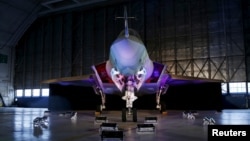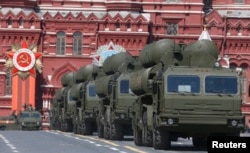U.S. lawmakers of both parties on Tuesday resolutely endorsed the Trump administration’s decision to halt delivery of F-35 fighter equipment to Turkey over Ankara’s decision to purchase a Russian surface-to-air missile system — a possible first step to blocking Turkey from acquiring the stealth jet altogether.
“If Turkey goes through with the Russian system, there is no way in the world that we can justify training them [on the F-35] and going through with our commitment on the [delivery of] the two F-35s,” Senate Armed Services Committee Chairman James Inhofe, an Oklahoma Republican, said.
“The two can’t exist [together], the F-35 and the Russian system,” said Democratic Sen. Joe Manchin of West Virginia, who also serves on the panel. “We’re not going to allow that to happen.”
Both senators spoke with VOA moments before the committee heard from President Donald Trump’s nominee to become NATO Supreme Allied Commander, U.S. Air Force Gen. Tod Wolters.
“I concur with this committee's belief that the S-400 [Russian missile system] and the F-35 are not compatible, and if Turkey proceeds down a path to procure and operate the S-400, they should not get the F-35,” Wolters said.
Danger to F-35s
Last week, Turkey’s foreign minister reaffirmed his country’s commitment to a deal with Moscow to buy the S-400, a system Washington believes could imperil the F-35, an advanced radar-eluding fighter jet. U.S. officials have warned that Turkey’s possession of both U.S. and Russian systems ultimately could help Moscow find ways to detect the F-35 and gain access to advanced American military technology.
“We cannot allow the technology of the F-35 to get into the hands of the Russians and our enemies,” New Hampshire Democratic Sen. Jeanne Shaheen told VOA.
Shaheen and three other senators have introduced legislation prohibiting the transfer of F-35s to Turkey until the Trump administration certifies that Ankara will not accept delivery of the Russian air-defense system.
“It would be better if we were able to simply have them eliminate the S-400,” South Dakota Republican Sen. Mike Rounds said of Turkey’s planned purchase.
Complicating the issue is Turkey’s role in the supply chain for assembling the F-35, which is made by U.S. aerospace and defense giant Lockheed Martin.
“Component parts of the F-35 are produced in Turkey, so we have to examine all the options,” Democratic Sen. Tim Kaine of Virginia said. “We need to really maximize our effort to achieve Plan A, which is that they don’t purchase the Russian system.”
'Mixed issues' with Turkey
Inhofe suggested Turkey’s role in F-35 production can be replaced.
“One time, they [Lockheed Martin] said, ‘We can’t make them without Turkey.’ We found that was not true,” the chairman said.
The Pentagon confirmed Inhofe’s assertion.
“The DoD [Department of Defense] has initiated steps necessary to ensure prudent program planning and resiliency of the F-35 supply chain,” acting Chief Pentagon spokesperson Charles Summers said. "Secondary sources of supply for Turkish-produced parts are now in development."
The disagreement over military systems is one of several points of tension that have arisen in recent years between Washington and Ankara.
“They’re an ally, they’re a NATO ally, but we’ve got a lot of mixed issues with them, from our support for the Kurds in northern Syria, who have been an effective fighting force against ISIS, to this issue [of military acquisitions],” Kaine told VOA.
The senator added, “But then again, we would not have been able to successfully prosecute the war against ISIS without using the Incirlik [Turkish military] base in Adana. So they have been a supportive ally in many ways.”
Asked how he would characterize Turkey as a U.S. ally, Manchin said, “Cautiously, very cautiously. I put them in the same category as I would Pakistan [a major non-NATO U.S. ally].”
VOA's Carla Babb contributed to this report from the Pentagon.





